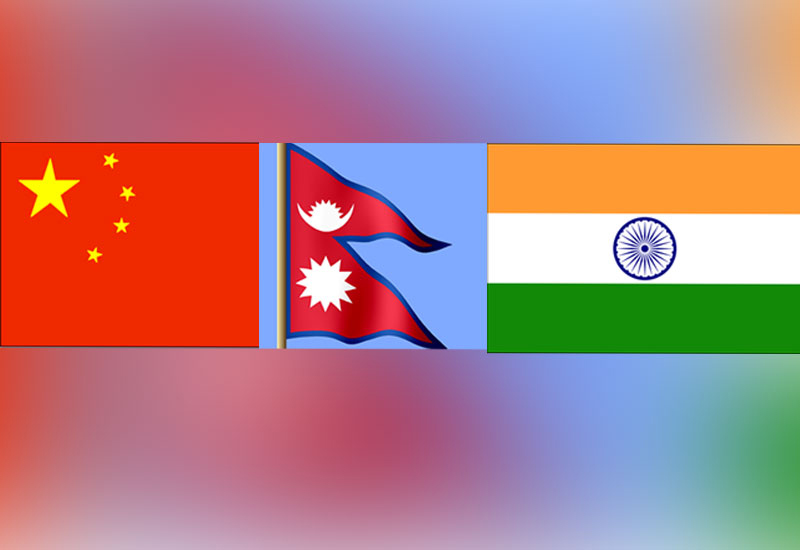
OR
Opinion
Nepal's Inconstant Neighborhood Policy
Published On: November 25, 2023 08:30 AM NPT By: Hari Prasad Shrestha

There is widespread perception that Nepal is on track to losing credibility with both the neighbors.
High level delegations from Nepal are regularly visiting India and China and similar types of delegations from India and China are also regularly visiting Nepal. But the outcome of such visits and discussion at a high level have been hardly in favor of Nepal.
Nepal has good relationships with both of its immediate neighbors, India and China despite some issues and concerns with them. The major issues with India are India’s reluctance to accept the joint report of India Nepal Eminent Persons’ Group and its repeated refusal to talk on border issues through mechanism of boundary working group especially over the disputed territories of Kalapani, Lipulekh and Limpiyadhura of Nepal, which India occupied during the India China war of 1962. This issue has also been linked with China as both India and China do not have sovereign rights over the disputed Lipulekh-Kalapani-Limpiyadhura area. However, the China-India negotiations of May 15, 2015 on augmenting the list of traded commodities and expanding the border activities through the Lipulekh Pass contradicts the Nepal-China Boundary Treaty of 1961. Another issue with China is the non-implementation of the project agreements under the Belt and Road Initiative (BRI) agreed between Nepal and China in 2015.
Nepal and India established diplomatic relations on 17 June 1947. The unwavering commitment to the principles of peaceful coexistence, sovereign equality, and understanding of each other’s aspirations and sensitivities has been the firm foundation on which our bilateral relations have been growing further. Nepal’s solemn desire to cultivate and foster the cordial and friendly ties with its neighboring countries are reflected in its long standing position of not allowing its territory to be misused by any elements inimical to India and also expects the same sort of reciprocity and assurances from her.
In a similar way, Nepal and China formalized their relations on 1 August 1955 by establishing diplomatic relations. The relations between the two countries have been marked by friendliness, understanding, mutual support, cooperation and respect for each other’s sensitivities. Both countries have relentless faith in the ideals of the Five Principles of Peaceful Co-existence. Nepal is firmly committed to One China policy and is also committed not to allow its soil to be used for any inimical activities against China.
India is in a very comfortable position in Nepal to exercise and implement any activities due to open the border between the two countries. Moreover, it has also a long-term strategy to keep Nepal under its sphere of influence. India’s one of the major economic interests in Nepal is to import power through construction of hydropower projects in Nepal and export of commodities and fuel to Nepal. There are several scattered small Indian projects in different parts of Nepal. Some large projects of strategic importance have been constructed with the objective to facilitate trade, especially India’s exports to Nepal, whether it is petroleum pipeline or inland container depots in border customs as Nepal has a very small product base to export through these facilities. Due to landlockedness, Nepal is dependent on India for trade and transit. This is shown by the fact that India’s share in Nepal’s total trade is around 62 percent and it accounts for one-third of Nepal’s foreign direct investments (FDI) and 100 percent for its oil supplies.
China has a little bit different strategy than India as it wants to see Nepal as a non aligned nation and expects no interference in Tibetan matters through Nepal. It has only recently started to take more interest in Nepal due to its rising strategic importance by expanding its social footprint through sending more tourists to visit Nepal's religious sites, opening Chinese language centers and investing one of the highest in infrastructure projects in Nepal.
There are several projects under execution in different parts of Nepal. Projects under the Belt and Road Initiative (BRI) and Trade and Transit Agreement (TTA) with Nepal in September 2018 to give Nepal access to four sea-ports (Tianjin, Shenzhen, Lianyungang and Zhanjiang) and three land ports (Lanzhou, Lhasa and Xigatse) in China have strategic importance in the long run.
Although, the trade and transit agreement with China and projects under BRI on connectivity are important for Nepal to balance connectivity with both the neighbors, Nepal has not been yet able to fully utilize the transit facilities due to cost effectiveness problems and projects under BRI are also not moving forward due to differences in investment modalities between the two countries. It would also be relevant to note that not only projects under the BRI are in the stage of standstill in Nepal but also other urgent infrastructure projects such as the second phase construction of the Ring Road and construction of all-weather reliable double-lane roads to Kathmandu from Kerung and Tatopani are not moving satisfactorily. This, somehow, reflects whether China is rethinking its assistance modalities in Nepal.
High level delegations from Nepal are regularly visiting India and China and similar types of delegations from India and China are also regularly visiting Nepal. But the outcome of such visits and discussion at a high level have been hardly in favor of Nepal.
Such unfortunate conditions for Nepal are not new, it also persisted before the restoration of democracy. More importantly, there is widespread perception that Nepal is on track to losing credibility with both the neighbors due to inconsistent policy with the neighborhood and lack of political will power to face the situation. There is also blame on our leadership that they hardly raise the most important issues of national interests with their counterpart as we can also evaluate from the outcome of their visits.
As a latest example, Prime Minister Pushpa Kamal Dahal in his recent visit to India signed many important economic agreements on construction of power projects, inland container depots, railway line, transmission line, petroleum pipelines, cross-border payments and transit agreement with India. However, the outstanding issues of the EPG report and Lipulekh-Limiadhura's disputed border issues were not discussed during his visit.
Thereafter, PM Dahal made an official visit to China where both the countries signed many agreements related to various sectors including agriculture, communication, science and technology, trade and cross-border transmission line etc. However, his visit did not touch on the implementation of projects under the BRI and Nepal's new map with China.
Lastly, Nepal is confused and bewildered in its neighborhood policy by feeling glory on petty economic dealings with neighbors and by sacrificing vital national interests. Whatever be the leader’s interest, until the joint EPG report is not accepted by India and disputed territory of Kalapani, Lipulekh and Limpiadhura are not resolved through continued dialogues in boundary working group by recognizing historical documents and evidences, anti-Indian sentiments among Nepali people would remain forever. So far as China is concerned, there are no such political issues with it, however early implementation of the BRI projects through accepted modalities with continued dialogue would be a win-win situation for both the countries and excessive delay on the BRI could only widen controversies between the two countries.
You May Like This

Balancing Act: Nepal's Delicate Dance with China and India
Nepal is strategically located between the emerging Asian giants: China and India. It has maintained cordial people-to-people relations with both... Read More...

Nepal should hedge
How should Nepal respond to a changing security context and handle pressures from greater powers like India and China? ... Read More...

'Nepal wants to be dynamic bridge between India, China'
KATHMANDU, Oct 17: Prime Minister Pushpa Kamal Dahal has said that Nepal wants to benefit by becoming a dynamic bridge between... Read More...






Just In
- Challenges Confronting the New Coalition
- NRB introduces cautiously flexible measures to address ongoing slowdown in various economic sectors
- Forced Covid-19 cremations: is it too late for redemption?
- NRB to provide collateral-free loans to foreign employment seekers
- NEB to publish Grade 12 results next week
- Body handover begins; Relatives remain dissatisfied with insurance, compensation amount
- NC defers its plan to join Koshi govt
- NRB to review microfinance loan interest rate












Leave A Comment